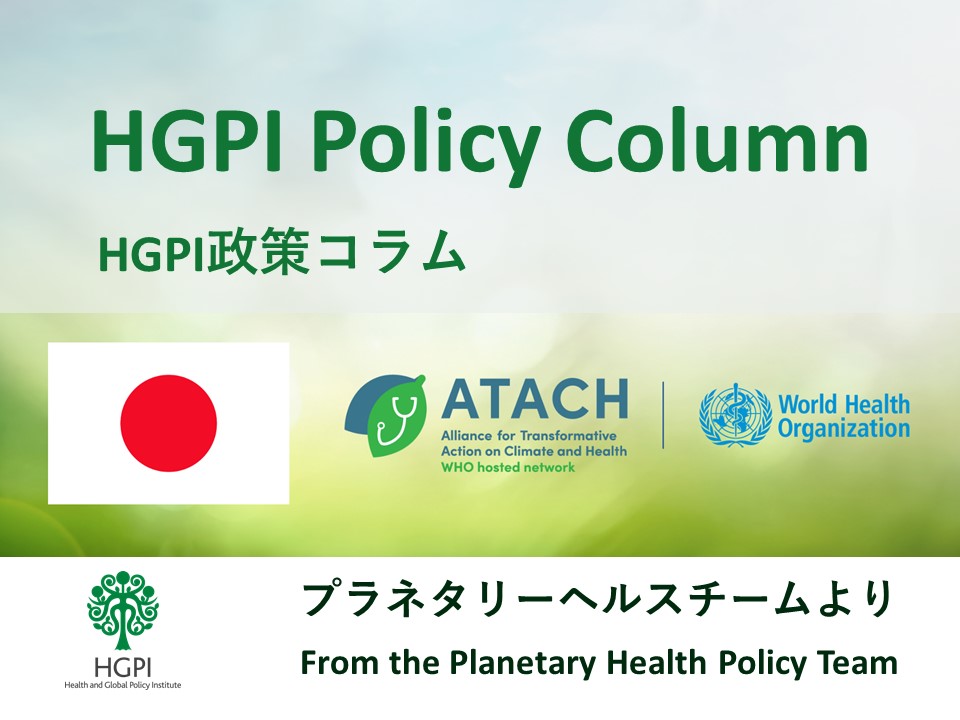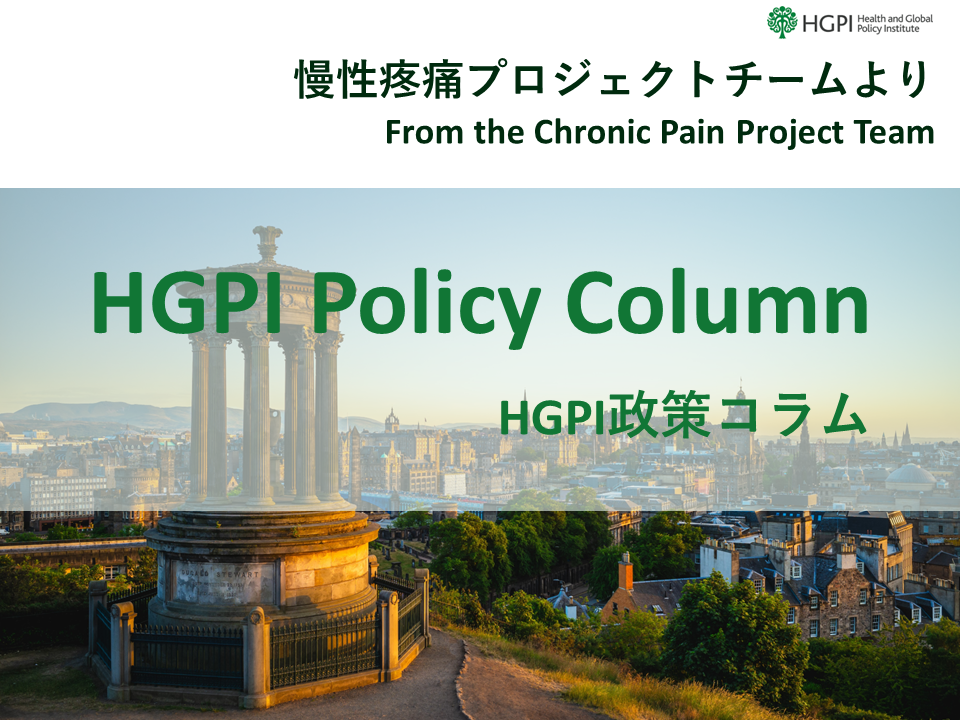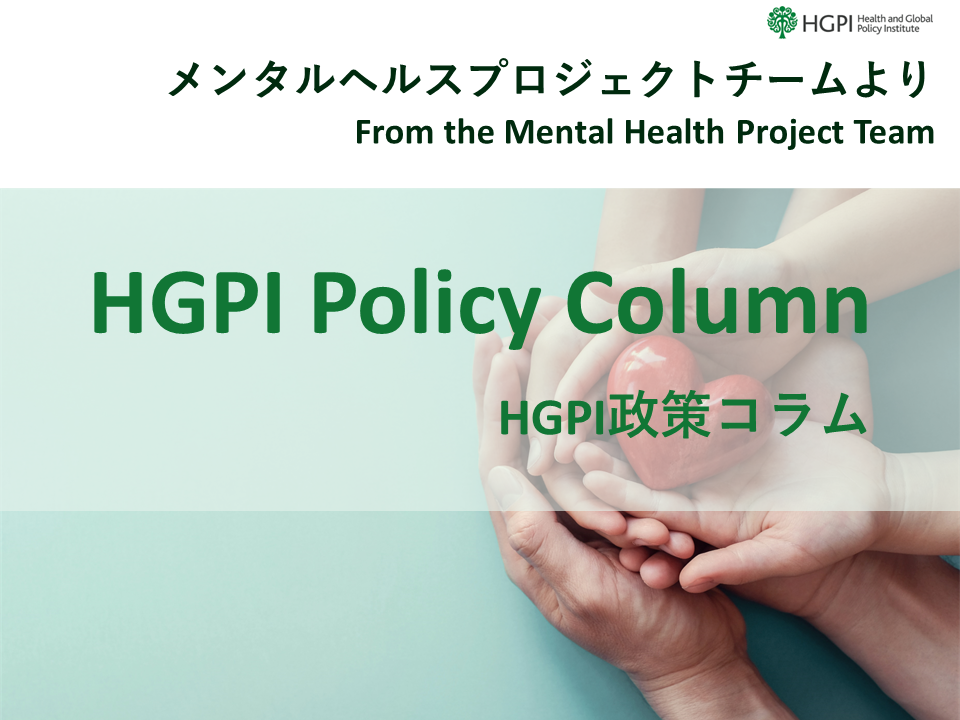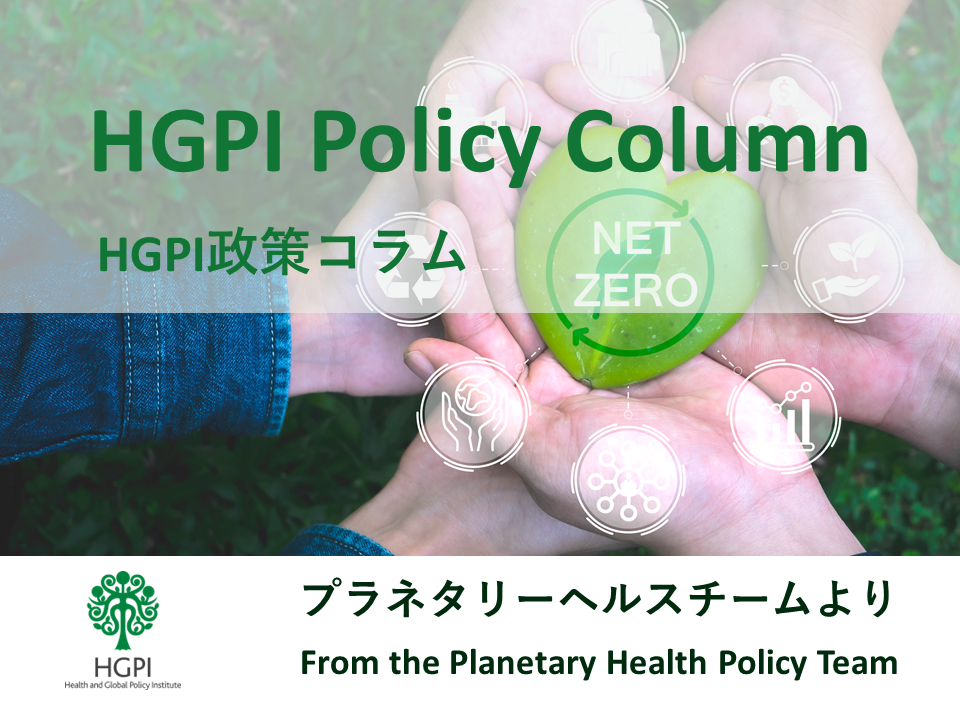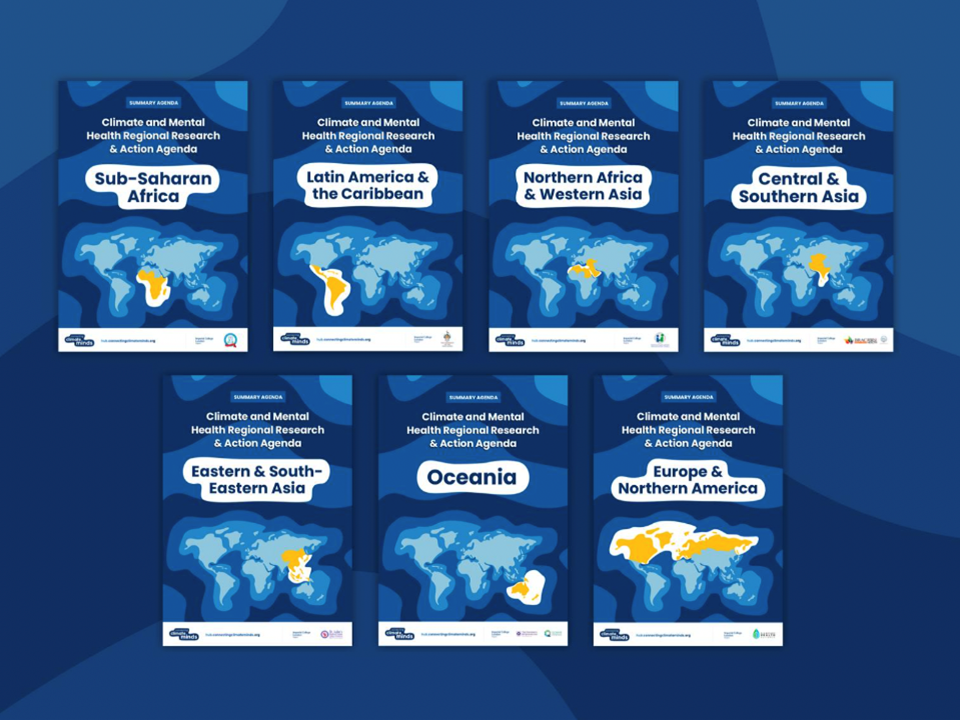[HGPI Policy Column] (No. 44) From the Planetary Health Policy Project Part 9 “Connecting Climate Minds: the Intersection of Climate Change and Mental Health”
date : 7/22/2024
![[HGPI Policy Column] (No. 44) From the Planetary Health Policy Project Part 9 “Connecting Climate Minds: the Intersection of Climate Change and Mental Health”](https://hgpi.org/en/wp-content/uploads/sites/2/column-44-top.png)
<POINTS>
- Connecting Climate Minds launched in April 2023 with a global team and shared vision on how to address two of the greatest challenges in the world today: climate change and mental health.
- Dialogues were held in 7 regions that brought together 900 people in over 90 countries across different relevant research disciplines, policy, healthcare, climate action, and communities with particular climate vulnerabilities, to identify emerging needs, opportunities, and research priorities.
- The Global Event was held in Barbados in March 2024 to finalize the Global Research and Action Agenda and celebrate the communities and all stakeholders involved in the project.
- Project outputs found in the Connecting Climate Minds Hub include resources on climate change and mental health such as videos, regional and thematic agendas for research and action, case studies, toolkits for researchers and humanitarian actors, and guidance on engaging with lived experiences.
Introduction
Connecting Climate Minds is a global initiative funded by Wellcome, that brings together expertise across research, policy, design, and lived experience from across the globe. The aim of the project is to develop a research and action agenda of global and regional community convenors dedicated to connecting climate change and mental health.
Health and Global Policy Institute (HGPI) was invited to participate as a Regional Co-Convenor (RCC) for the Eastern and South-Eastern region in the Connecting Climate Minds project. In this year-long project, 900 participants across diverse disciplines from more than 90 countries, representing 7 regional communities, came together to connect, learn, and understand ways in which to better accelerate global efforts to address the current challenges at the intersection of climate change and mental health.
The links between climate change and mental health can take many different forms. For example, people fleeing wildfires may develop post-traumatic stress disorder, hospitals seeing more patients experiencing mental and physical distress during heatwaves, an increase in suicide rates among farmers following a year of drought, children being exposed to air pollution are put at a higher risk of developing mental health conditions, Indigenous communities experiencing grief over the loss of their land, customs, and livelihoods.
There is still more research that needs to be done, but enough is known to understand the urgent need to address the mental health implications of the impact climate change has on mental health.
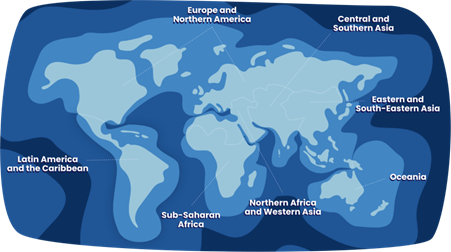
The Project Vision
The Connecting Climate Minds project had two key goals:
1) To create an aligned and inclusive research and action agenda for climate change and mental health based on lived experience needs and insights.
2) To catalyze connections across climate change and mental health fields, building regional and global communities of practice.
All involved in the project worked together at both the regional and global levels. The project also invited people already living with the impacts of the climate crisis on their mental health to share insights based on their unique lived experiences, through their personal stories of the challenges they have faced and of resilience.
By creating a thriving global ecosystem of people working in climate and in mental health with shared understandings and visions across diverse disciplines, those involved can be better equipped to respond to emerging challenges and opportunities at this vital intersection of two of our greatest global crises.
Project Outputs
Communities of Practice
To facilitate collaboration across disciplines and sectors, Communities of Practice in seven regions were established. The seven regional Communities of Practice were led by Regional Community Convenors, with the regional teams also including Co-Convenors, Lived Experience Advisory Groups, and Youth Ambassadors, bringing together the climate and mental health communities in research, practice, and lived experience in each region. Dialogues were held among the communities at both the regional and global levels.
- 2 Regional Dialogues in 7 regions brought together stakeholders across different relevant research disciplines, policy, healthcare, climate action, and lived experience to identify emerging needs, opportunities, and research priorities for their region and foster communities of practice.
- 3 Global Dialogues by and for communities with particular climate vulnerabilities: youth, Indigenous communities, and smallholder farming communities were also held.
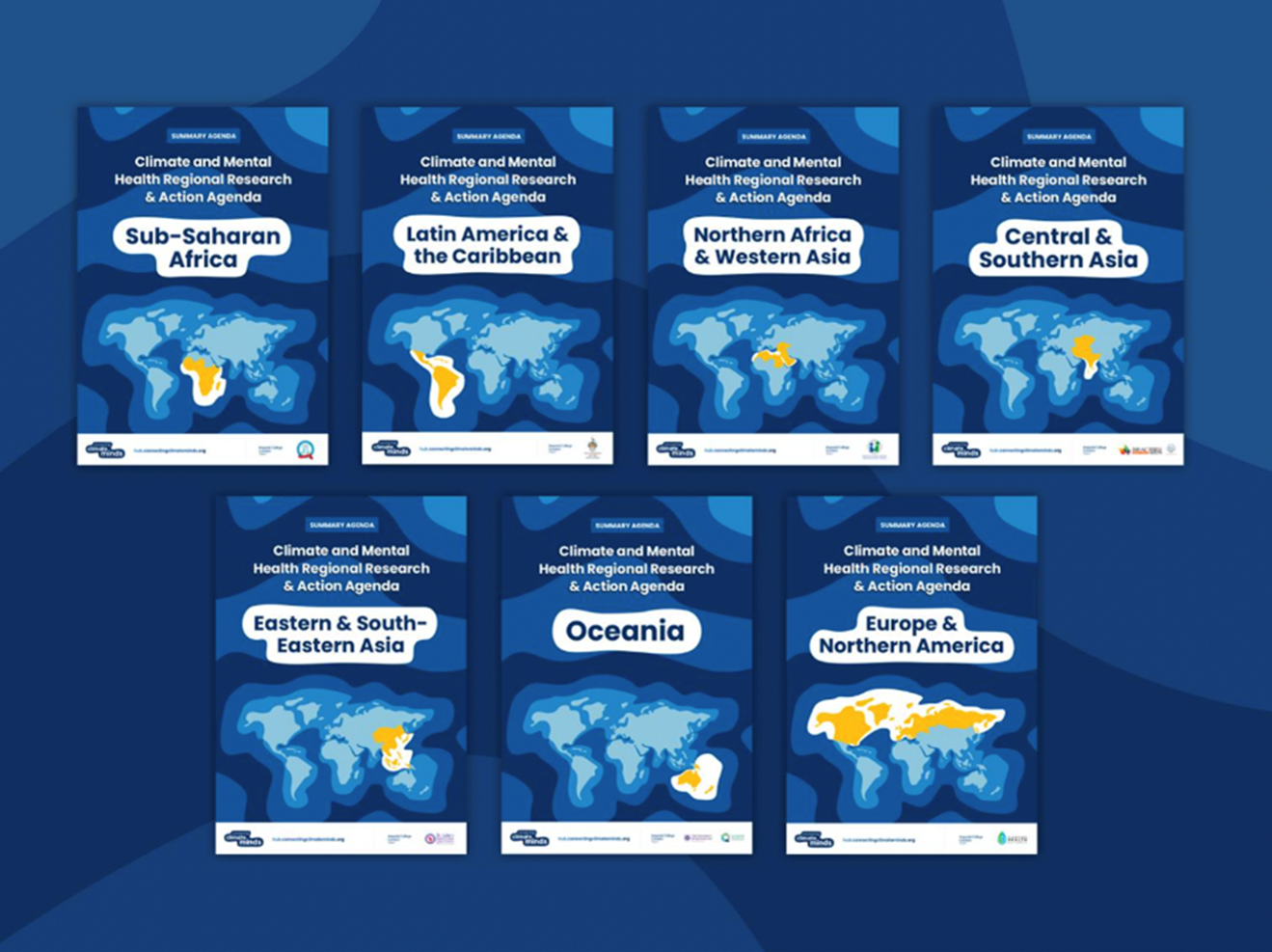
Academic and non-academic outputs
Throughout the project, research and action items were developed to provide insights and actionable and accessible resources to help enact the research and action agenda. These include reports, case studies, lived experiences, and toolkits, all designed to support collaboration between disciplines and accelerate and align the growing field of climate change and mental health. For the Eastern and South-Eastern regions, HGPI introduced shirin-yoku (forest bathing) as a case study as one potential solution as an intervention to the mental health impacts caused by climate change. Originating from Japan, shinrin-yoku has been shown to regulate mood and improve overall mental health, particularly with a greater effect on improving anxiety, which suggests that shinrin-yoku could be an effective intervention for climate anxiety and other emotional consequences of climate change.
The Global Event
The culmination of the Connecting Climate Minds project was the Global Event, held March 19-21, 2024, in Barbados, over 800 participants representing 7 regional communities of practice came together in person and virtually. During the event, participants were able to listen to firsthand lived experiences from the people in each region on the negative impacts that climate change-related stressors have had on their livelihoods.
Mr. Joji Sugawara, Vice President at HGPI, and Ms. Niaya Harper Igarashi, Program Specialist, attended in-person and virtually to present highlights on Japan as a Regional Co-Convenor (RCC) for the Eastern and South-Eastern region. Mr. Sugawara presented on the current activities of HGPI concerning planetary health and the commitments of the Planetary Health Advisory Board for this year. He highlighted the importance of engaging multiple stakeholders to advance planetary health, including mental health, and the need to bridge the gap between research, policy, and politics.
Participants also worked in groups to share, refine, and finalize the Regional and Global Research and Action Agendas and identify opportunities to support the sustainability of the Connecting Climate Minds work going forward.
A total of 30 priority research themes emerged across the four key research categories of the project:
(1) impacts, risk, and protective factors
(2) pathways & mechanisms
(3) co-benefits of climate action for mental health, and
(4) mental health interventions in the context of climate change.
The Connecting Climate Minds Hub
The Connecting Climate Minds Hub which launched at the Global Event, is an online space for learning, connection, and collaboration. The hub is a go-to platform for climate change and mental health research, where you can access the resources mentioned, such as toolkits, case studies, and lived experience stories.
Important Resources
The Regional Agendas set out aligned priorities for research and action in the seven regional communities to understand and address the needs of people experiencing the mental health burden of the climate crisis and to enable this research to translate evidence into action in policy and practice.
Collaborate is a meeting space for individuals and organizations from various fields to connect and collaborate. Whether seeking expertise for a project, looking to join forces on research, or wanting to share innovative ideas, sign up to start networking with researchers, policymakers, educators, and community groups to share knowledge, resources, and experiences in climate change and mental health.
The work that has come out of the Connecting Climate Minds project will be essential to ensure that mental health priorities are aligned at the regional and global levels while catalyzing the necessary investment in the climate change and mental health field going forward.
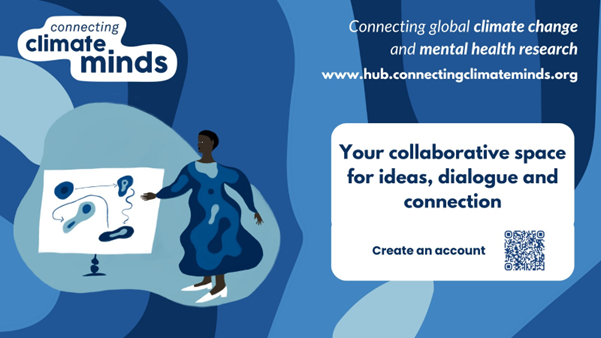
The Global Agenda sets out priorities for research and action that have been developed from dialogues and consultation with over 600 experts in research, policy, practice, and lived experience in 80+ countries.
Join Connecting Climate Minds for the upcoming launch of the Global Research and Action Agenda for climate change and mental health!
The event will take place online, Tuesday 23rd of July, 12:00-13:00 BST (20:00-21:00 in Japan)
You can register to join at the link here.
Works referenced
[1] Guinto, R. R., Alejandre, J. C., Bongcac, M. K., Guilaran, J., Salcedo, S. S., & Sunglao, J. A. (2021). An agenda for climate change and mental health in the Philippines. The Lancet Planetary Health. https://doi.org/10.1016/s2542-5196(21)00284-9
[2] Lawrance, E.L., Massazza, A., Pantelidou, I. et al. Connecting Climate Minds: a shared vision for the climate change and mental health field. Nat. Mental Health 2, 121–125 (2024). https://doi.org/10.1038/s44220-023-00196-9
[3] Climate mental health — making connections. Nat. Mental Health 2, 119–120 (2024). https://doi.org/10.1038/s44220-024-00212-6
Authors
Niaya Harper Igarashi (Program Specialist, Health and Global Policy Institute)
Eri Cahill (Program Specialist, Health and Global Policy Institute)
Top Research & Recommendations Posts
- [Policy Recommendations] The Path to a Sustainable Healthcare System: Three Key Objectives for Public Deliberation (January 22, 2026)
- [Research Report] Perceptions, Knowledge, Actions and Perspectives of Healthcare Organizations in Japan in Relation to Climate Change and Health: A Cross-Sectional Study (November 13, 2025)
- [Research Report] The 2025 Public Opinion Survey on Healthcare in Japan (March 17, 2025)
- [Policy Recommendations] Reshaping Japan’s Immunization Policy for Life Course Coverage and Vaccine Equity: Challenges and Prospects for an Era of Prevention and Health Promotion (April 25, 2025)
- [Research Report] The 2023 Public Opinion Survey on Satisfaction in Healthcare in Japan and Healthcare Applications of Generative AI (January 11, 2024)
- [Research Report] AMR Policy Update #4: Cancer Care and AMR (Part 1)
- [Policy Recommendations] Developing a National Health and Climate Strategy for Japan (June 26, 2024)
- [Public Comment Submission] “Assessment Report on Climate Change Impacts in Japan (Draft Overview)” (December 24, 2025)
- [Research Report] Survey of Japanese Physicians Regarding Climate Change and Health (December 3, 2023)
- [Research Report] The Public Opinion Survey on Child-Rearing in Modern Japan (Final Report) (March 4, 2022)
Featured Posts
-
2026-01-09
[Registration Open] (Hybrid Format) Dementia Project FY2025 Initiative Concluding Symposium “The Future of Dementia Policy Surrounding Families and Others Who Care for People with Dementia” (March 9, 2026)
![[Registration Open] (Hybrid Format) Dementia Project FY2025 Initiative Concluding Symposium “The Future of Dementia Policy Surrounding Families and Others Who Care for People with Dementia” (March 9, 2026)](https://hgpi.org/en/wp-content/uploads/sites/2/dementia-20260309-top.png)
-
2026-02-05
[Registration Open] (Webinar) The 141st HGPI Seminar “Current Status and Future Prospects of Korea’s Obesity Policy: Voices of People with Lived Experience in Policy Promotion” (March 3, 2026)
![[Registration Open] (Webinar) The 141st HGPI Seminar “Current Status and Future Prospects of Korea’s Obesity Policy: Voices of People with Lived Experience in Policy Promotion” (March 3, 2026)](https://hgpi.org/en/wp-content/uploads/sites/2/hs141-top-1.png)
-
2026-02-06
[Research Report] AMR Policy Update #5: Cancer Care and AMR (Part 2)
![[Research Report] AMR Policy Update #5: Cancer Care and AMR (Part 2)](https://hgpi.org/en/wp-content/uploads/sites/2/HGPI_20260204_AMR-Policy-Update-5.png)




